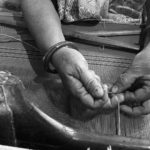When the landscape is stark, you dress up. You carry your wealth.
The Indian aesthetic is not minimal. We are a more-is-more-culture, not a less-is-more culture. There are a few states like Kerala where the textiles are simple, white and minimal, relatively speaking. In contrast, look at Rajasthan and Gujarat. Both states embrace exuberant colour, extravagant textiles with mirror work, embroidery, and other embellishments. Why?
Well, here is one possible reason: the Thar desert. When the land is stark, you make up for it by ornamenting yourself. Nowhere is this culture of ornamentation more obvious than in Kutch: home to Ajrakh block prints, Bandhini tie-dye, Bhujodi weaves– not to mention silver jewellery, lacquerware, rogan art and leather work.
On reason why Kutch is so rich craft-wise has to do with the occupation of the people there. As author and textile expert Archana Shah says below, when you are a nomadic pastoral community, you get more time during the day– while the cattle or sheep are grazing. In contrast, agriculture is a high-intensity, high-labour occupation. Where is the time to embroider or do bandini when you are caught up in the agricultural cycle?
Gujarat, perhaps more than any state, save its neighbour, Rajasthan, has a maximalist aesthetic. People here deck themselves up on a daily basis. They use their hands to create beauty. As Shrujan, the NGO has documented, there are at least 45 types of embroidery in Kutch alone, each practiced by a different group: the Ahirs, Rabaris, Muttvas, Sodas, and others. Each of these groups developed motifs and methods of textile manipulation that are specific to land, climate and culture. Here, textile expert and author, Archana Shah explains why.




